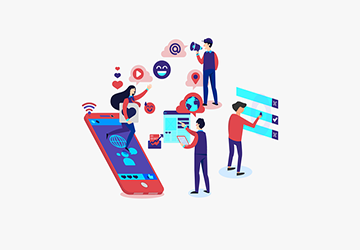The Impact of Social Media on Mental Health
Do you mindlessly scroll through your feed and compare yourself to others? Or are you opting for a more measured approach and looking for positivity and motivation?
No matter which spectrum you fall on, it's clear that social media plays an influential role in how we think and operate. As such, it can have a significant impact on our emotional health.

This article explores how social media can affect your mental health and provides tips on using it wisely. So let's get started!
Social Media and Mental Health - Impact
Excessive use of social media has been linked to severe mental disorders such as anxiety, depression, eating disorders, feelings of loneliness, low self-esteem, and body dysmorphia. Most of the research that makes this connection has centered around teens and young adults, as they tend to be the most prominent social media consumers and, therefore, the most affected.
Fear
Anxiety may be one of the mental health issues most closely associated with social media use.
Forms of communication on social media are primarily non-verbal, writing text messages, comments, and tweets. This type of communication lacks essential components of social interaction, such as facial expressions, tone of voice, and body language. Often this leads to misunderstandings that cause people to panic about what would otherwise be low.
Depressed
Most of the time, people show their good side on social media. Most people don't post about going to a funeral, but they do post about going to a concert. This creates misunderstandings about other people's lives, and it comes down to one thing: social comparison. This unhealthy trait of comparing yourself to idealized versions of others creates feelings of inadequacy and jealousy, eventually leading to depression.
Research has shown that several factors related to social media use can contribute to depression, including:
· Loneliness and FOMO (Fear of Missing Out) - Feeling left out, especially when their social circle doesn't include them.
· Cyberbullying - targeting hate/racism/sexism and other forms of harassment is strongly linked to social media use, which can lead to depression.
· Self-criticism, self-doubt, and low self-esteem - People who observe other people's accomplishments, accomplishments, and appearance can become self-critical. They experience failure and grief and eventually lose their heart.
Eating disorder
A study of participants aged 19 to 32 in Pittsburgh, Pennsylvania, found that social media was associated with eating disorders. Young people who spend a lot of time on social media are more likely to complain about concerns about their eating habits, such as overeating and dieting, the results showed.
Additionally, studies have found that people exposed to more visual content, such as TikTok and Instagram, are likelier to exhibit unusual eating habits. The study also showed a link between social comparison and eating disorders.
Using Social Media Carefully – Tips for a Healthier Relationship with Technology
Despite its detrimental effects on mental health, social media can significantly improve our lives and social interactions. The secret is in balance, so maintain perfect boundaries.
Let's talk about how to use social media sparingly.
Set limits
As mentioned earlier, social media is designed to be addictive. The amount of time you spend on social platforms is directly proportional to its negative impact on mental health.
It's essential to limit the time you spend on social media. This can be done by setting and sticking to time limits or by selecting specific times of day to use social media.

Practice self-awareness
Remember, social media is a bright spot to offset issues like body dysmorphia and social comparison. Most of what you see is an inaccurate representation of life because it only shows the highs, not the lows, and the joys, not the lows.
It's best to practice self-awareness by acknowledging your emotions and thoughts when using social media. Take a break when you feel overwhelmed, and prioritize your emotional health.
Customize your feed
Our mental health is greatly affected by what we consume on social media. Therefore, ensuring your feed is free of harmful content is necessary.
It helps if you only practice accounts that make you happy or motivate you. If you come across a statement that you don't think fits you or makes you feel anxious, inappropriate, or unhappy, don't hesitate to unfollow it.
Most apps allow you to hide content you don't like. For example, if you find a post on Instagram annoying, you can click "not interested." This will hide the bar and modify the algorithm that monitors posts in your feed and prevents such posts from entering your meal in the future.
Interact with others attentively
Interacting with others on social media is a great way to make friends and build connections. However, conscious use of social media can make this experience more positive and fulfilling and help avoid adverse outcomes such as addiction, social comparison, and anxiety.
Some things to keep in mind are:
· Avoid arguments
· Avoid negative interactions
· Build positive relationships
· Limit the amount of time you spend with others on social media
· Block/remove people who affect your health
· Report cyberbullying
· Practice gratitude
· Pay attention to your emotions
Take a break
Finally, it's essential to step away from social media now and then. Even if it's just for a few hours or days, taking a break can help you distract yourself from whatever is bothering you.
I would use this time for other enjoyable and worthwhile pursuits. Read a book, exercise, cook your meals, or go for a walk; anything that takes you off social media for a while. You can deactivate your account if you want a more extended break to focus on yourself. Many social platforms allow you to deactivate your account and temporarily delete your budget while maintaining your sanity and health.
Diploma
In conclusion, excessive use of social media has been found to have detrimental effects on our mental health, including anxiety, depression, and more. However, by using practical ways to improve your experience on these platforms, you can turn your use of social media into a positive experience that enhances your well-being. Remember to prioritize your mental health and use social media to connect, inspire and spread positivity.







